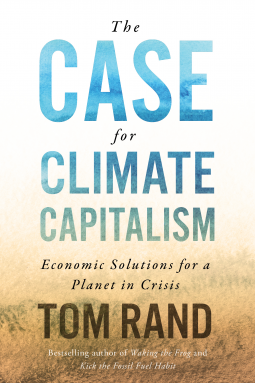
The Case for Climate Capitalism
Economic Solutions for a Planet in Crisis
by Tom Rand
This title was previously available on NetGalley and is now archived.
Buy on Amazon
Buy on Waterstones
*This page contains affiliate links, so we may earn a small commission when you make a purchase through links on our site at no additional cost to you.
Send NetGalley books directly to your Kindle or Kindle app
1
To read on a Kindle or Kindle app, please add kindle@netgalley.com as an approved email address to receive files in your Amazon account. Click here for step-by-step instructions.
2
Also find your Kindle email address within your Amazon account, and enter it here.
Pub Date 3 Mar 2020 | Archive Date 3 Dec 2019
Talking about this book? Use #TheCaseForClimateCapitalism #NetGalley. More hashtag tips!
Description
Tom Rand's climate change treatise is a rallying call to put aside our differences, reclaim capitalism, force profits to align with the planet, and transition to a low-carbon, clean-energy economy. Publishers Weekly hails it as “[a] strong, well-reasoned argument for the left and right to work together for the common good.”
“A necessarily provocative take-down of economic, political and climate change orthodoxies paired with a radically practical plan for finally getting serious about saving ourselves.” — Tim Gray, Executive Director, Environmental Defence
A warming climate and a general distrust of Wall Street has opened a new cultural divide among those who otherwise agree we must mitigate climate risk: anti-market critics such as Naomi Klein target capitalism itself as a root cause of climate change while climate-savvy business leaders believe we can largely continue with business as usual by tinkering around the edges of our economic system.
Rand argues that both sides in this emerging cultural war are ill-equipped to provide solutions to the climate crisis, and each is remarkably naïve in their view of capitalism. On one hand, we cannot possibly transition off fossil fuels without the financial might and entrepreneurial talent market forces alone can unlock. On the other, without radical changes to the way markets operate, capitalism will take us right off the climate cliff.
Rejecting the old Left/Right ideologies, Rand develops a more pragmatic view capable of delivering practical solutions to this critical problem. A renewed capitalism harnessed to the task is the only way we might replace fossil fuels fast enough to mitigate severe climate risk. If we leave our dogma at the door, Rand argues, we might just build an economy that survives the century.
“A necessarily provocative take-down of economic, political and climate change orthodoxies paired with a radically practical plan for finally getting serious about saving ourselves.” — Tim Gray, Executive Director, Environmental Defence
A warming climate and a general distrust of Wall Street has opened a new cultural divide among those who otherwise agree we must mitigate climate risk: anti-market critics such as Naomi Klein target capitalism itself as a root cause of climate change while climate-savvy business leaders believe we can largely continue with business as usual by tinkering around the edges of our economic system.
Rand argues that both sides in this emerging cultural war are ill-equipped to provide solutions to the climate crisis, and each is remarkably naïve in their view of capitalism. On one hand, we cannot possibly transition off fossil fuels without the financial might and entrepreneurial talent market forces alone can unlock. On the other, without radical changes to the way markets operate, capitalism will take us right off the climate cliff.
Rejecting the old Left/Right ideologies, Rand develops a more pragmatic view capable of delivering practical solutions to this critical problem. A renewed capitalism harnessed to the task is the only way we might replace fossil fuels fast enough to mitigate severe climate risk. If we leave our dogma at the door, Rand argues, we might just build an economy that survives the century.
Available Editions
| EDITION | Other Format |
| ISBN | 9781770415232 |
| PRICE | US$27.95 (USD) |









